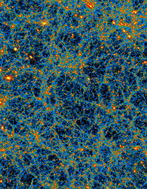Areas of Excellence
Probing the Fundamental Structure of Matter with High Energy Particle Collisions

Total Funding Approved
- HK$78.832M
Indicative Project Time-Frame
- 2019-2027
Coordinating Institution
- The Chinese University of Hong Kong (Prof. Chu Ming Chung)
The discovery of the Higgs boson (popularly known as 'the God particle') at the Large Hadron Collider (LHC) at the European Organization for Nuclear Research (CERN) ushered in a golden age for fundamental physics. The Higgs boson is an elementary particle that interacts with leptons, quarks and weak force carriers to give them their masses via a presumably new fundamental force.
One of the most important tasks in fundamental physics today is to measure and characterize the properties of the Higgs boson including its interactions with other elementary particles. The Higgs boson may also open up a new window to Physics Beyond the Standard Model (BSM) if it couples to hidden particles, such as dark matter particles. There may be more than one Higgs particle, as predicted in many BSM theories. In the next decade, the LHC will undergo two more upgrades, so as to reach the unprecedentedly high centre-of-mass energy of 14 TeV and intensity 5-7x1034cm-2s-1, endowing it with heightened sensitivity for new physics.
With the support of three previous grants from Collaborative Research Fund, the project team has established itself as an active member of the A Toroidal LHC Apparatus (ATLAS) experiment at the LHC, and as one of the most active particle theory groups in the region. The team is placed at the right time and in the right place to seize the emerging opportunities to make breakthrough discoveries that may revolutionize our understanding of the fundamental structure of matter. It has carried out fundamental work on the Higgs particle, establishing its spin and parity and couplings to Standard Model (SM) particles, and designed new strategies for probing BSM physics.
Moreover, analysis tools have been developed, complete with an ATLAS Tier-2 computing centre in Hong Kong. The team intends to build upon its existing strengths in particle physics to measure the Higgs properties, search for BSM physics, develop particle physics theories and contribute to the ATLAS detector upgrade and to the R&D for the proposed Circular Electron-Positron Collider (CEPC) in China, as well as developing enhanced techniques in Big Data computing and machine learning. The proposed project is at the forefront of particle physics research and will enable Hong Kong to take full advantage of the looming opportunities. The project will substantially raise the profile of Hong Kong scientists and their global impact and attract students to STEM subjects, while promoting interdisciplinary research in physics, electronics, detector development, computing and data science.


